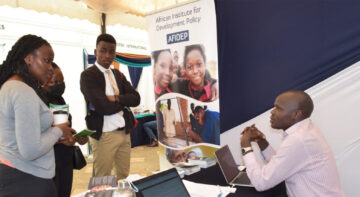Blogs

Coronaviruses (CoV) are a large family of viruses that cause illness ranging from the common cold to more severe diseases. The current novel coronavirus (COVID-19) outbreak, which began in December 2019, presents a significant challenge for the entire world. The virus has been detected on every continent except Antarctica with concentrations of thousands of cases in some areas. The World Health Organization declared COVID-19 a pandemic on March 11 2020.
Common signs of infection include respiratory symptoms, fever, cough, shortness of breath and breathing difficulties. In more severe cases, infection can cause pneumonia, severe acute respiratory syndrome, kidney failure and even death. Standard recommendations to prevent infection spread include regular hand washing, covering mouth and nose when coughing and sneezing and to avoid close contact with anyone showing symptoms of respiratory illness such as coughing and sneezing. Keeping safe distance approach as recommendation is a challenge in developing and/or under developed countries where the radius between the community household is less than recommended safe distance space.
Currently majority of the countries have exercised forced quarantine to curb the spread of the pandemic. Countries experiencing new cases have taken swift action to suspend the school calendar with a total of 85 countries globally closing schools. In addition, most of the staff working in all sectors including private and public sectors are no longer working with a few working from home. Over and above, to follow the trend countries are shutting down the retail economy, shops except pharmacies and grocery stores. People have been instructed to stay at home and may enter public places only for necessary shopping or commuting to work. This kind of forced quarantine is crucial to minimize further cases. However, no substantial evidence has emerged to show the impact to the economy precisely in Low Middle Income Countries (LMIC).
Globally more than 60 per cent of the world’s employed population are in the informal economy, hence it means that they cannot afford not to work from home and a day spent without work means no pay. A new International Labour Organization (ILO) report shows that 2 billion people work informally, most of them in emerging and developing countries. That is very practical in Low and Middle Income countries that are having COVID-19 new cases and exercising forced quarantine. The loss of income for casual workers in Low and Middle Income Countries will result in extreme rental stress for people who were already on low incomes. This issue demands urgent attention to prevent a homelessness epidemic.
In response to the crisis, some governments like Germany and United State of America have introduced a short-time work allowance and granted generous credit assistance, guarantees or tax deferrals for distressed companies/industries and individuals. A short-time work allowance approach is granted when the regular customary weekly working hours are shortened temporarily in companies or departments due to economic reasons or an inevitable event. The approach has been tested and proved to be an economic cushion and all countries that are quick to make shutting down of activity nationwide should be replicating the approach which is a policy in developed countries to prevent job losses. However, for the African countries there are no economic boosters in place to cushion the citizens.
Coronaviruses are a large family of viruses that have been studied for decades, we presume that it’s possible to look at the characteristics of similar viruses as a reasonable guide to this one. Nonetheless, the COVID-19 strain have met us by surprise, it is possible that an outbreak or pandemic of COVID-19 could occur in multiple waves or the virus might mutate to complex structure to present the disease with seasonal pattern in future.
It’s important to learn the disease trend and stringent measures in place in other countries and put the evidence informed experience into context rather than following majority decision which are not evidence informed. For example, even though the forced quarantine might seem to work its evident the disease has a close to 14 days’ asymptomatic window period, hence the new cases infected today will be evident in fortnight. Therefore, in those countries who are surprisingly reporting the cases now might experience increased cases in the next coming weeks. On the other hand, those countries that were pioneers with this infection currently in recovery phase due to various measures put in place three weeks ago cannot guarantee recurrent state by similar disease once the quarantine is offset.
Majority of those countries that have big impact of coronavirus casualty or fatality are having aged population. Amid scarce evidence on the uncertainty swirling around the coronavirus pandemic, trends from other countries shows the undeniable fact that the highest rate of fatalities is among older people, particularly those with underlying medical conditions. Depending upon what the emerging evidence starts to tell us on the impact of national age structures, it may be necessary to ensure readiness for a future wave of activity mostly in Africa where the majority are young population.
Currently the experimental trial and data are still to emerge for the testing of drugs and initial development of vaccines and/or improved therapies or tests to help reduce the impact of the disease. However, it’s evident that the vaccination uptake among non-childhood phase is uncommon mostly among adulthood and/or elderly population. Therefore, with these novel vaccines in the pipeline studies focusing on improved understanding of adulthood/elderly vaccination are critical and will become increasingly relevant in the future.
Gathering evidence about effective interventions in order to inform decision-making going forward rather than following panic intervention that might not be one size fit all based on the context is crucial. On the economic perspective, a severe recession due to the disease can no longer be avoided, and some economists are already calling for governments to introduce measures to reinforce aggregate demand. But that recommendation is inadequate, given that the global economy is suffering from an extraordinary economic scenario. Researchers will need to keep emerging research under close review to curb the current evidence gap.
This article has been published by both the Nation Malawi and Business Daily newspaper-Kenya.
Dr Leyla is a Research and Policy Analyst at the African Institute for Development Policy (AFIDEP)
Related Posts





